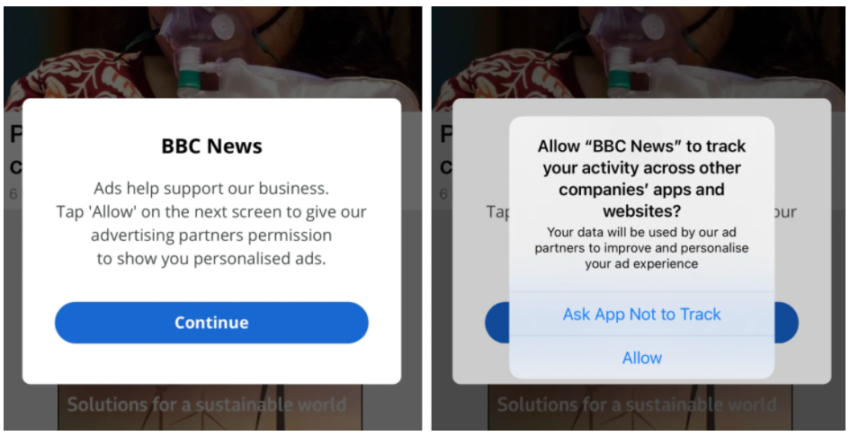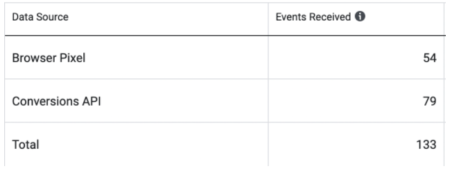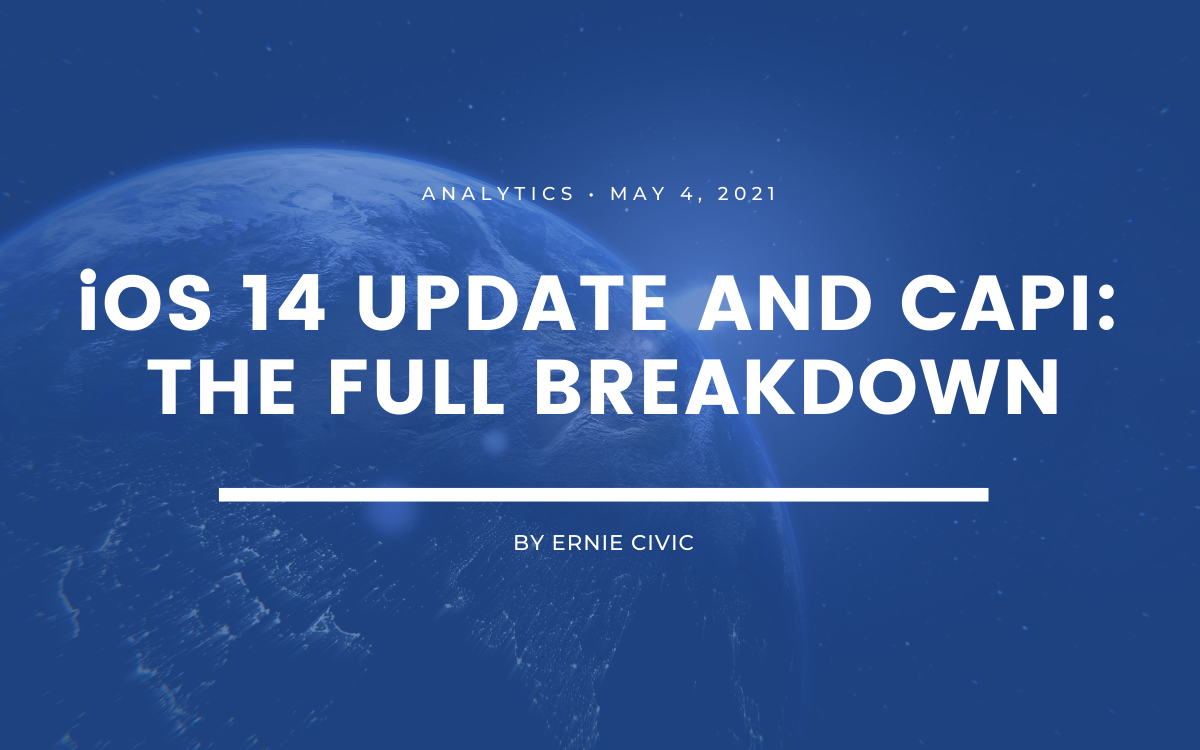iOS 14 Update and CAPI: The Full Breakdown
7 min to read ✭ In this post, you'll learn how the new iOS 14 update is affecting the way we market on Facebook and the future of Facebook tracking.
The iOS 14 Update
Apple is fully launching its iOS 14.5 update which will include a large privacy change in letting users choose to either opt-in or opt-out of app/website tracking. Tim Cook was interviewed on April 12, 2021, and said “I believe people should be asked to give consent to modern advertising techniques. In Apple’s case, the new software will include a pop-up, asking users if they consent to allow an app or company to track them across apps and websites owned by other companies in order to deliver personalized ads to you.”
All Apple users will receive a pop-up telling them this:

This will leak from the app world and into the website pixel tracking realm as well. With the IDFA (Identifier For Advertisers) being removed, our ability to target specific interest audiences will be very limited. We also will run into issues when retargeting website visitors should they opt-out.
How It Impacts Facebook
Facebook at one point was expecting a pretty significant drop in traffic but that might be changing as aggregated events are launched, Conversion API takes effect, and on-platform acquisitions are normalized.
With so many users on Facebook, Instagram, Snapchat, TikTok, LinkedIn, etc. Facebook has stopped its panic and mentioned earlier that they believe this will be a good thing moving forward. We are guessing this is because most people already gave their 1st party data to these platforms when signing up. However, we don’t know how it will be used yet.
Currently, these are the impacts of iOS 14.5:
Insights From Non-Facebook Websites
We will likely see a huge decrease in CPM but a larger increase in CPAs due to the level of personalization here. Since Facebook can’t fire specific signals to identify a specific user it will lead to a larger top funnel and a smaller mid to low funnel due to audiences being less relevant.
Reduced Segmentation
As the support for viewing breakdowns on age, gender, etc will be harder to match/find, having a clear and deep understanding of who our users are and really working on great ad copy will be key.
Lookalikes and Remarketing
As more people remove their IDFA tag, the ability to target your website visitors will naturally become harder. Lookalikes are typically created by Facebook’s algorithm based on the data we collected on our website – this will likely go away or become very irrelevant. Usually, remarketing audiences are some of the best performing audiences. We can expect a decrease in conversion here. We do want to note that you can still utilize on-platform retargeting and in our experience, this has outperformed remarketing significantly.
Social Advertising
With Facebook losing some of its power, it’s natural to think that most advertisers will start experimenting with other platforms more. You could start utilizing TikTok, Snapchat, or another platform to capture top-funnel data and use those learnings to push your Year-End donation appeal on Facebook. We do strongly believe that the platform will remain relevant and Facebook will continue its reign of power and data since most people already gave their info a long time ago. We also think this affects nonprofits a little differently. If someone is visiting their website, they likely want to be updated/tracked by them.
Reporting
3-day delay will take effect with iOS 14.5. There is also a lot of information on reporting. Here is Facebook’s breakdown and ways to ensure your reporting remains a success.
With all that said, Facebook launched the Conversions API which has been very exciting and already a game-changer when it comes to data collection. Server-side tracking is going to be the key to more accurate reporting and conversion metrics/optimizations.
Here is a current example of how much more data we were able to capture by implementing CAPI for our “Let’s Talk” page.

As you can see there is over a 130% increase in data collected within a week of implementing CAPI.
What is the Conversions API (CAPI)?
With the iOS 14 update, Apple is making it much harder for apps and websites on Apple devices to track user behavior. Apple is doing a few things to make this happen including giving iOS 14 users the ability to turn off tracking at the device level and putting limitations on event tracking, regardless of a user’s settings. This is impacting all data collection tools including Google Analytics, the Facebook pixel, and others.
These changes are imminent, and when fully in effect (Apple hasn’t announced when they will go live), apps and websites on Apple devices may be blocked from sending the conversion event information (purchases, leads, add to carts, etc.) that organizations usually track in Ads Manager. This means that unless changes are made to how we track events in Facebook, Facebook advertising will eventually start to lose its effectiveness, which will cause campaign results to decline.
As a result, Facebook has developed a new tool that will help the consumers send data through something called the Conversions API also known as “Server-Side API.” Conversions API is a Facebook Business Tool that lets organizations share key web and offline events, or customer actions, directly from a server to Facebook. Conversions API works with the Facebook pixel to help improve the performance and measurement of Facebook ad campaigns.
How Does it Work?
Currently, most people have the Facebook pixel installed directly on their website or indirectly through Google Tag Manager. When a user loads an organization’s website, the pixel fires at the browser level. With each page the user visits and action the user completes (add to cart, purchase, lead, etc.), the browser sends an update back to Facebook. Facebook then tells the advertiser in Ads Manager how many purchases, leads, add to carts, and so on an ad generated.
With the Conversions API, when a user clicks on a Facebook ad and lands on a website, Facebook will send a unique ID for that user to the server. The server will track the user via this ID as they visit different pages on the website and note if they complete a purchase, opt for a lead magnet, add a product to their shopping cart, and other actions. The server will then send a message back to Facebook saying what action this user ID completed.
At least for the time being, both browser and server events will continue to fire. When Facebook receives the server event, it checks to see if it also has a corresponding browser event. If the browser event is blocked—say because Apple blocked the browser-level tracking—Facebook will use the server event instead. If Facebook has both events, it will “deduplicate” the events and use just the browser event (deduplicate meaning that it won’t count the redundant event).
The biggest difference between the two tracking methods is that the Conversions API only tracks data that users willingly give us, such as submitting a form that includes their name, phone number, and email. As a result, we are able to collect data while still adhering to privacy laws such as CCPA, GDPR, and the iOS 14 updates. If we combine both the browser-side pixel and the server-side tracking, we can create a better picture of how users move through our funnel because the Conversions API gives us more reliable data on not only conversions but on subscription management (changing subscription levels), consideration phase, and leads.
Benefits of CAPI
The benefits of the Conversions API mean that businesses and nonprofits will be able to have complete visibility of their marketing efforts.
More Accurate Data
- CAPI allows you to fill in the holes that the pixel doesn’t have visibility on, like email open rates
- Since the end conversion data is more accurate, combining the two will give us full-funnel visibility since the pageview pixel gives us top of funnel visibility and CAPI provides end of funnel visibility
Accurate Data Sharing
- Since data is processed on the server-side, businesses don’t have to worry about things getting lost from cookie blockers, iOS updates, etc.
- Because CAPI doesn’t rely on the browser and the user’s connection, we have more information about a customer’s journey and events that are happening across websites, mobile apps, and various platforms such as email
- We can also track events for actions that happen both online and offline. CAPI allows you to track conversions that happen in-person or over the phone.
- This means a nonprofit organization can upload their donor list and market their fundraising on Facebook and use offline tracking to determine if any of the donations occur offline.
Data Control
- Conversions API gives businesses the ability to control what data is shared and when. The Facebook pixel shared all data in real-time. This also means that companies that store tons of user data can control what is shared with clients to add on another layer of security.





